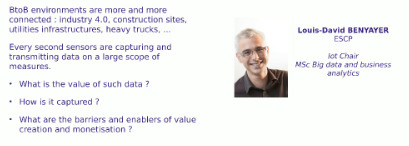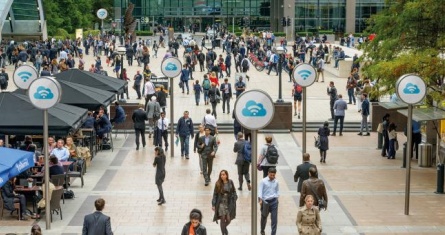Before entering the isolation phase, the IoT Chair intended to organise a conference about BtoB IoT Data: what value creation and monetisation strategies ?... and decided to organise it online.
The conference was held on Thursday 9 April just after the 3-hour presentation of the IoT company projects.
BtoB environments are more and more connected: industry 4.0, construction sites, utilities infrastructures, trucks, ... Every second, data related to a wide range of measures is captured by sensors and transmitted. What is the value of such data? How is it captured? What are the barriers and enablers of value creation and monetisation?

"Closing the course on "strategy at the age of IoT", this conference addresses a major topic for IoT : how data transforms companies and changes competition. This topic blends technical, legal, marketing and strategic dimensions. All are intertwined when it comes to value creation. Our 5 speakers stressed one important message : as the value of data grows when it is used and shared, the ability of a company to organise the data gathering and sharing within a business ecosystem is key." explains Louis-David Benyayer, Affiliate professor at ESCP, who designed this event.
This conference gathered 5 experts:
Pascal Zammit (Michelin, Group Senior Vice President, Business Venture Connected Mobility, Global Services and Solutions Business Line) shared Michelin initiatives in data monetisation and sharing.
Adrien Basdevant (Lawyer, Member of the Paris Bar) discussed the specificities of industrial data and the mechanisms of value capture and sharing.
Stéphane Derville (Mobivia, Research & Innovation), presented how data changes the economics of the mobility market.
Martin Ducroquet (Sencrop, General Manager and ESCP Alumnus) and Anicet Bart (Sencrop Head of Data), explained how Sencrop’s connected agriculture solution data creates value.

About 70 participants attended this 2-hour event, including students who have reached the end of their semester of IoT specialization. A nice way to add a further brick to their IoT skills.
Let’s have a look at their feedback:
For Beatrice Lona, “the conference was really helpful in giving interesting insights on the various applications of data. In particular, in the presentation made by Stéphane Derville of Mobivia, what emerged is how a traditional sector such as the automotive industry needs to evolve and to be digitalized. In order to do so, and to therefore support the digitalization of this industry, data accessibility is needed. In fact, data are necessary, for example, for car maintenance or repair, or for the automation of the vehicle. These data, to be valuable, have to be provided in an open standard format. Moreover, when moving towards a more digitalized automotive industry, there is a refocusing from considering “vehicles as a simple product” to “vehicles as a service”.
For Anna Parolin, speakers brought to the audience many valuable and concrete insights. Among them, Pascal Zammit, who represented the business reality of Michelin.
“First, Pascal explained us how Michelin started right from the beginning to embrace an ideation process inspired by ad-hoc innovative techniques (such as Design Thinking, empowerment of employees’ ideas, construction of a creativity-favorable work environment, hackathons, collaboration with the customers, etc.) to undertake the data potential challenges. Unfortunately, at the beginning, all these initiatives did not return the expected results. That is where we were strongly reminded that the major issue is alignment. Having ideas is very simple, what is determinant is performing perfectly in the alignment for effective execution. Therefore, there is this need to bridge the gap between strategy and execution.
Secondly, he explained the difficulty to move an industrial tier system (indeed, very traditional and characterized by processes and structures in loop) towards a less efficiency-based and more experiment-based system where benefiting from data usage is key. Hence, there is the need to manage the trade-off between investing in new technologies and systems without penalizing already existing industrial processes, especially when facing the characteristics of traditional industrial business.
Thirdly, he stressed how Michelin tried to have a “servitization” of its industrial business. In particular, my curiosity was attracted by the “tier” as a service principle (aiming not only at producing tiers, but at making tiers useful tools to collect and study data), and by the “becoming experts” strategy (aiming at becoming experts in consumers’ behaviors, in tier usage and in road conditions, to provide services connected to tier usage). Pascal provided an excellent example of moving a business from a merely industrial one to a more servitized one, seizing the potential of data.”
Campuses

